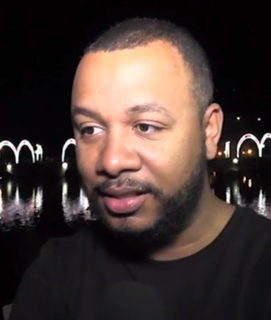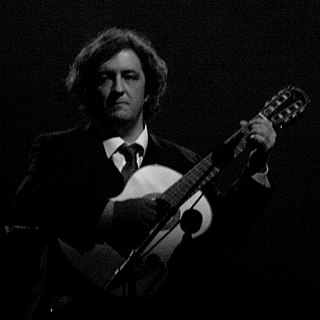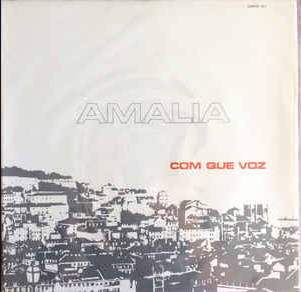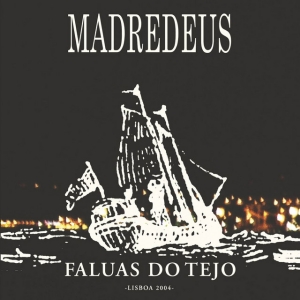
Carlos ParedesComSE was a virtuoso Portuguese guitar player and composer. He is regarded as one of the greatest players of Portuguese guitar of all-time.

Madredeus are a Portuguese musical ensemble formed in 1985, in Lisbon, Portugal. Their music combines traditional Portuguese music, fado and folk music.

Maria Teresa de Almeida SalgueiroOIH is a Portuguese singer. She is best known as the lead singer of Madredeus from 1987 until 2007. She also appeared in Wim Wenders' film Lisbon Story.

Rui Manuel Gaudêncio VelosoCavIH is a Portuguese singer-songwriter and musician.

Ângelo César do Rosário Firmino, better known by the stage name Boss AC is a Portuguese rapper originally from Cape Verde. The letters A and C, in Boss AC, come from the initials of his two names, Ângelo and César, respectively.

Existir is the second studio album by Portuguese group Madredeus. It was released on 12 May 1990 through EMI-Valentim de Carvalho.
Rodrigo Costa Leão Muñoz Miguez, known professionally as Rodrigo Leão, is a Portuguese musician and songwriter. He became known in the 1980s as a member of the Portuguese groups Sétima Legião and Madredeus. In the 1990s, Leão launched his career as a solo artist, with multiple albums reaching number-one in the Portuguese album charts.

Pedro Aires Ferreira de Almeida Gonçalves Magalhães, known as Pedro Ayres Magalhães, is a Portuguese musician, best known as a founding member and the main songwriter of the musical group Madredeus. Magalhães has also been a member of the pop-rock band Heróis do Mar and the Portuguese supergroup Resistência.
Pedro de Araújo, was a Portuguese organist and composer who worked with the Roman Catholic Archdiocese of Braga, northern Portugal. He was singing master at the Conciliar Seminary of St. Peter and St. Paul in Braga between 1663 and 1668, and second organist at Braga Cathedral until 1665. Like Juan Cabanilles, he was one of the last representatives of the traditional concentrated Iberian style.
Electrónico is a 2002 compilation album by the folk-influenced Portuguese band Madredeus. The tracks come from the following albums: O Espirito Da Paz, Ainda, O Paradiso, Antologia and Movimento.

Ar de Rock is the debut album by Portuguese musician Rui Veloso, released in July 1980 by EMI-Valentim de Carvalho.

Mingos & Os Samurais is the fifth studio album by Portuguese musician Rui Veloso, released on 7 August 1990 by EMI-Valentim de Carvalho. It is a concept album that tells the story of a small suburban band during the 1960s and the 1970s.

José Mário Branco was a Portuguese singer-songwriter, actor, and record producer.

Com Que Voz is a fado album recorded by Amália Rodrigues in January 1969 and released in March 1970 on the EMI and Valentim de Carvalho labels. It reached No. 1 on the Associação Fonográfica Portuguesa (AFP) chart in Portugal. Amália was accompanied on the album by Pedro Leal on viola and José Fontes Rocha on Portuguese guitar.

Ainda: Original Motion Picture Soundtrack From The Film «Lisbon Story» is a soundtrack album by Portuguese group Madredeus for the 1994 film Lisbon Story, directed by Wim Wenders. It was released on 7 March 1995 by EMI-Valentim de Carvalho.

O Espírito da Paz is the third studio album by Portuguese group Madredeus. It was released on 23 June 1994 by EMI-Valentim de Carvalho.

O Paraíso is the fifth studio album by Portuguese group Madredeus. It was released on 20 October 1997 by EMI-Valentim de Carvalho.

Movimento is the sixth studio album by Portuguese group Madredeus. It was released on 9 April 2001 by EMI-Valentim de Carvalho.

Um Amor Infinito is the seventh studio album by Portuguese group Madredeus. It was released on 17 May 2004 by EMI-Valentim de Carvalho.

Faluas do Tejo is the eighth studio album by Portuguese group Madredeus. It was released on 14 February 2005 by EMI-Valentim de Carvalho.

















